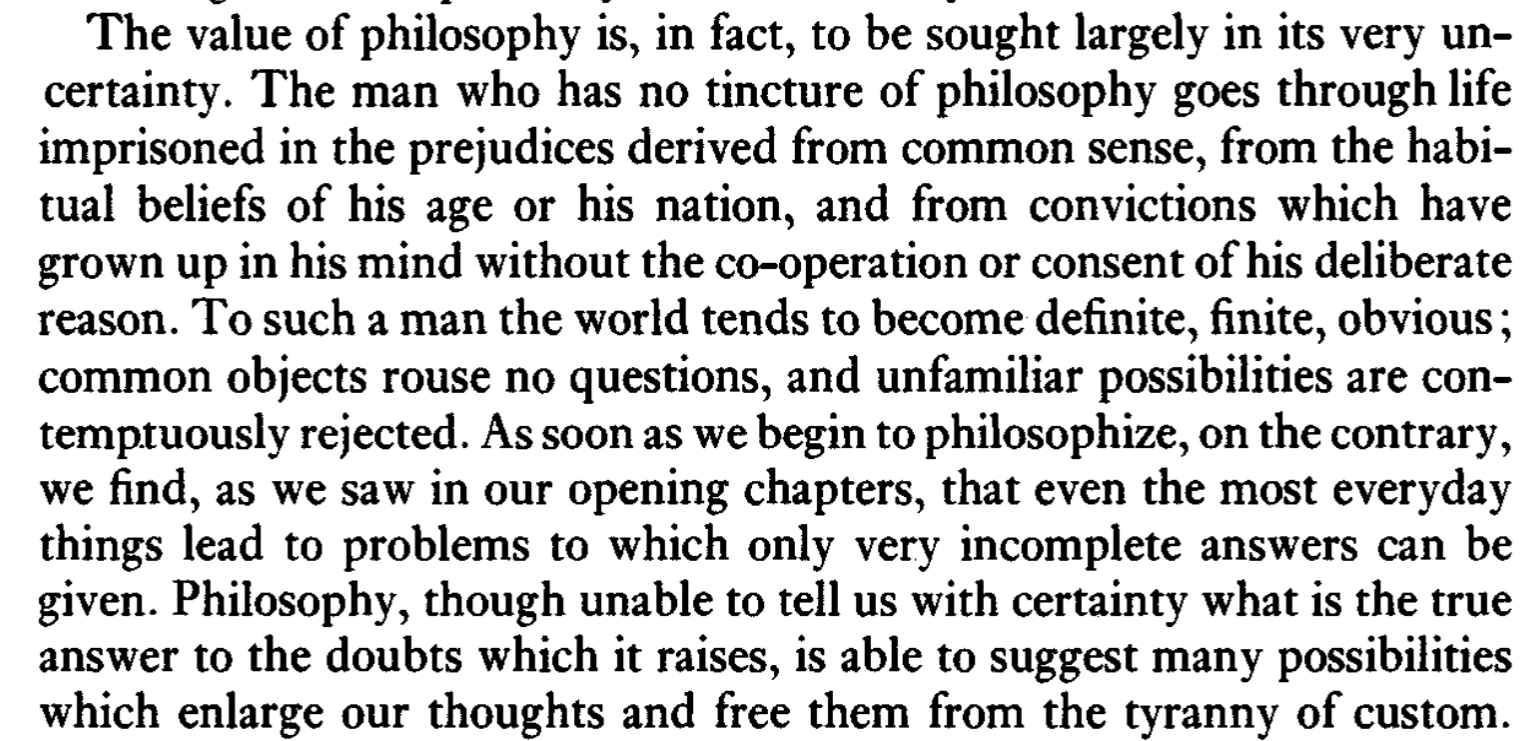Week 3 Science& Philosophy
Literature Review
- Russel The Problems of Philosophy "The value of Philosophy" pp. 89-94
- Sunday Greve and Williamson 2022 "Philosophy as a Science" pp. 30-35Topic 03 (2) Sunday-Greve and Williamson 2022 Philosophy as a science
Comparing Russell's and Williamson's Views on Science and Philosophy:
Both Bertrand Russell and Timothy Williamson see philosophy and science as interconnected, but they differ in their emphasis and specific claims:
Russell:
-
Science as a tool for philosophy: Russell believed that philosophy should utilize the methods and findings of science to address its questions. He saw science as a powerful tool for understanding the world and believed that philosophy could benefit from its clarity and rigor.
-
Emphasis on logic and analysis: Russell championed the use of logic and analysis in philosophy, believing that many philosophical problems could be clarified or even solved by applying these tools. This approach is evident in his work on logicism, where he attempted to reduce mathematics to logic.
-
Skepticism towards traditional metaphysics: Russell was skeptical of traditional metaphysics, which he saw as often relying on vague and unverifiable claims. He believed that philosophy should focus on questions that could be addressed through scientific methods and logical analysis.
Williamson:
-
Philosophy as a non-natural science: Williamson argues that philosophy itself is a science, albeit a non-natural one. He emphasizes that philosophy employs systematic, critical, and evidence-based inquiry, similar to natural sciences like physics or biology, but focuses on different types of questions and methods.
-
Rejection of the "asking questions" model: Williamson criticizes the view that the value of philosophy lies solely in asking questions without seeking answers. He argues that asking questions without attempting to answer them is ultimately pointless and that philosophy should strive for progress in understanding.
-
Emphasis on progress in philosophy: Williamson believes that philosophy has made significant progress, although it may not be as readily apparent as progress in natural sciences. He argues that progress in philosophy often takes the form of developing better models and frameworks for understanding complex phenomena, rather than discovering absolute and definitive answers.
Key Differences:
-
Characterization of philosophy: While both see connections between science and philosophy, Russell views science as a tool for philosophy, while Williamson goes further and classifies philosophy itself as a non-natural science.
-
Focus on progress: Russell seems more focused on using science to clarify and solve philosophical problems, while Williamson emphasizes the progress made within philosophy itself, even if it takes a different form than scientific progress.
-
Attitude towards traditional metaphysics: Russell is more skeptical of traditional metaphysics than Williamson, who seems more open to exploring metaphysical questions through philosophical methods.
Overall:
Both Russell and Williamson advocate for a close relationship between science and philosophy. However, their emphasis differs, with Russell focusing on science as a tool for philosophical analysis and Williamson arguing for philosophy's own scientific nature and progress.
Review of Paradoxes
The Sorites Paradox
The problem of higher-order vagueness

Supervaluationism lies in the differentiation between borderline cases and "heaps"
What about other attributes of hair like diameter
Resembling the process of diffusion, or adding information or making something detailed, does it start "resembling" or "getting more categorized" to a specific item. See Fabian's PPT discussion cat, tree analogy"
Newton’s Philosophiae Naturalis Principia Mathematica
The value of Philosophy #ontology
From Topic 03 (1) Russell 1912 (pp. 89-94) The problems of philosophy Page 91.

Russel seems to be focusing on value of phil as to a person, while Williamson is considering the question over its value to academia and science and general community will be
Russel seems to begin by asserting there's a clear distinction between science and phil amking a contrast between these two
pre-supposing that this distinction is important and phil shall not get categorized in science
Williamson is empiricist why he has vague position compared with Russel
Williamson 2022 'What Phil is'
Central Claim:
- Phil. is a non-natural science (Mathematics is a non-natural science, biology is a natural science) (How they are both abstractions of world, non-natural subjects of research)
- Phil. can seamlessly git into intellectual landscape of total science
Q. Why is philosophy not a natural science (too)? #exercise
A. Research subjects are nor derived directly in world or immediate perception
Suggested exercise: #exercise
This and the following reconstructions can be made more rigorous and precise. Try to do so
Argument 3:
- P1: The critic does not realize how much philosophy overlaps other disciplines
- P2: Significant progress in these overlap areas
- C: Philosophy has made significant progress
- Fringe of Science(Cutting-edge)
22, ‘WhatPhilosophy Is’ (1 of 2) ‘Those who offer the asking-without-answering model of philosophy have not thought hard enough about what it is to ask a question’ ArgumentP1 Normally, when asking
show annotationIn comparisoon with the ask-answering model
^htyulrxnlgp